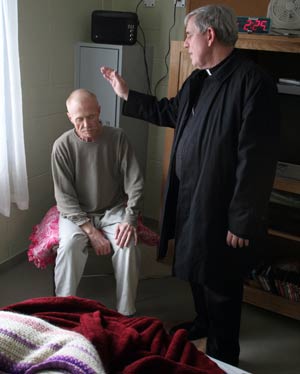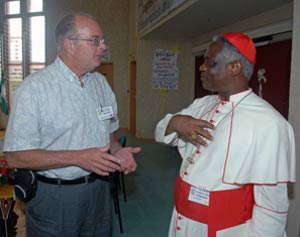Although he has retired after 22 years as Catholic chaplain at the Dodge County Correctional Institution in Waupun, Paul E. Rogers is still very much involved in prison ministry. Archbishop Jerome E. Listecki blesses William Froehlig at the infirmary after Mass at Dodge Correctional Institution in Waupun, on Dec. 23, 2011. The archbishop celebrated Mass for inmates and staff at the maximum security prison. (Catholic Herald photo by Allen Fredrickson)
Archbishop Jerome E. Listecki blesses William Froehlig at the infirmary after Mass at Dodge Correctional Institution in Waupun, on Dec. 23, 2011. The archbishop celebrated Mass for inmates and staff at the maximum security prison. (Catholic Herald photo by Allen Fredrickson)
Rogers, 56, now pastoral associate and director of religious education for the primary grades at St. Peter Parish, Slinger, remains president of the 150-member American Catholic Correctional Chaplains Association.
In his second term as leader of that national group, Rogers recently traveled to Africa for the 13th International Commission of Catholic Prison Pastoral Care (ICCPPC) World Congress in Yaounde, the capital city of Cameroon, Africa. Approximately 180 individuals representing 60 countries attended the congress last October, according to Rogers.
Representing the Vatican at the congress was Cardinal Peter Turkson, president of the Pontifical Council of Justice and Peace and the first Ghanaian cardinal. Cardinal Turkson, 63, is the son of a Methodist minister and his Catholic wife. The cardinal, Rogers learned, is well-acquainted with Milwaukee Archbishop Jerome E. Listecki.
Another dignitary at the ICCPPC event was Cameroon-born Cardinal Christian Tumi, emeritus archbishop of Douala (the country’s largest city).
“It was like a mini-UN,” remarked Rogers. “It was exciting to be there.” ICCPPC world congresses are held every four years, the 2007 edition having been in Rome, where delegates had an audience with Pope Benedict XVI.
Rogers carried an American flag during opening ceremonies at this year’s congress. Attendees heard instantaneous translations of speakers’ words in any of three languages. Rogers delivered a report on prison ministry in the United States, while fellow delegates reported on the ministry in their own countries.
Workshops dealt with such subjects as religious freedom in prison, prevention of torture, immigrants in prison, female prisoners, and overcrowding.
Rogers, who called working with prisoners “an easily overlooked ministry” which “at times can be lonely (and) isolated,” noted that Cardinal Tumi in his address  Cardinal Peter Turkson of the Pontifical Council of Justice and Peace meets with Paul Rogers last October in Yaounde, Cameroon, Africa, during an International Catholic Conference of Prison Pastoral Care. (Submitted photo courtesy Paul Rogers)emphasized the role of bishops in the ministry, suggesting that bishops should make tending to the incarcerated a priority. The cardinal also deplored the practice of locking up people without benefit of trial. In certain countries, Rogers explained, “You’re guilty until proven innocent.”
Cardinal Peter Turkson of the Pontifical Council of Justice and Peace meets with Paul Rogers last October in Yaounde, Cameroon, Africa, during an International Catholic Conference of Prison Pastoral Care. (Submitted photo courtesy Paul Rogers)emphasized the role of bishops in the ministry, suggesting that bishops should make tending to the incarcerated a priority. The cardinal also deplored the practice of locking up people without benefit of trial. In certain countries, Rogers explained, “You’re guilty until proven innocent.”
Interviewed late last year in his office at St. Peter, Rogers told your Catholic Herald that, outside the United States, American court sentences tend to be regarded as harsh and the sheer number of American prisoners as shocking.
“We isolate (criminals) pretty well,” he said, noting that it’s a circumstance that can have a detrimental effect “over years” on those isolated. Rogers said the death penalty, common in parts of the United States, is nonexistent in certain South American countries and virtually unheard of in Europe.
An official state visit to a prison in Cameroon indicated that Africa’s detention picture isn’t a pretty one. Rogers saw “3,000 guys jammed (over) two stories, like sardines.” Prisoners’ clothes were tattered and hygiene was lacking. Mothers incarcerated in Cameroon, Rogers noted, take care of their babies in prison.
More InfoPaul Rogers invites individuals desiring more information about prison ministry to call him at (262) 627-0636. |
A highlight among presentations at the congress was given by Sister of St. Mary of Namur Genevieve Uwamariya who spoke on the power of reconciliation. A number of years ago the African nun looked upon the corpses of her parents, killed in a machete attack in conjunction with tribal warfare in Rwanda, said Rogers. Sr. Genevieve subsequently met her parents’ killer – and told her ICCPPC audience of having to wrestle to overcome her vengeful feelings.
Liturgy participants might have heard English and French, as well as native dialects, during the congress. Cameroon “is a very Catholic country,” according to Rogers, and its “government was very cooperative,” aiding delegates by, for one thing, providing police escorts in the face of nightmarish traffic in Yaounde, which has a population approaching 2 million.
The congress included an exhibit of international, inmate-produced art. At least some of the works were for sale, producing funds for inmates’ families. Delegates brought along gifts, made by prisoners in their own countries, to exchange with colleagues.
Rogers’ contribution was a ceramic coffee mug crafted by an inmate at the last prison island in the United States – McNeil Island in Puget Sound near Olympia, Wash. “Most people think of Alcatraz” when thinking of American prison islands, Rogers said. Like Alcatraz, the Washington prison is now closed.
From a Tanzanian prisoner, by way of chaplain Fr. Joseph Candutta, Rogers received a banner with drummer and dancer figures superimposed on a map of Tanzania.
Rogers left Cameroon resolved to continue pointing lay people in the direction of prison ministry, while encouraging bishops’ assistance in spreading the word. He is involved in organizing prison ministries, currently in the La Crosse area.
